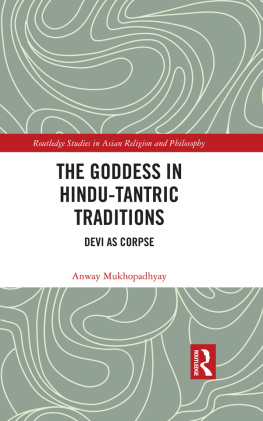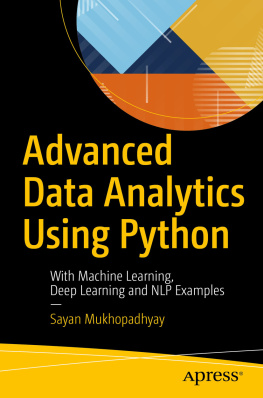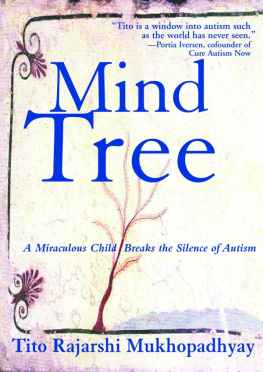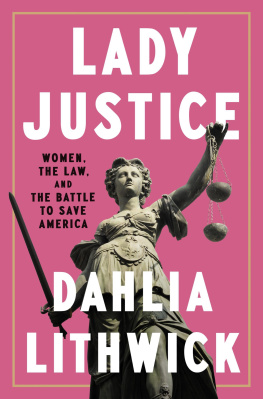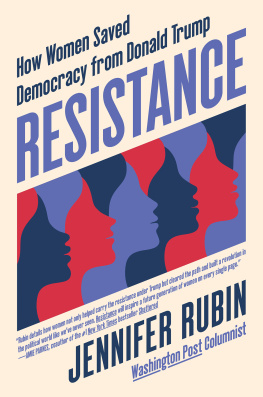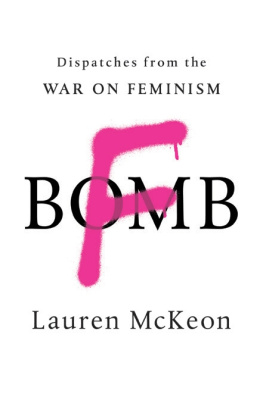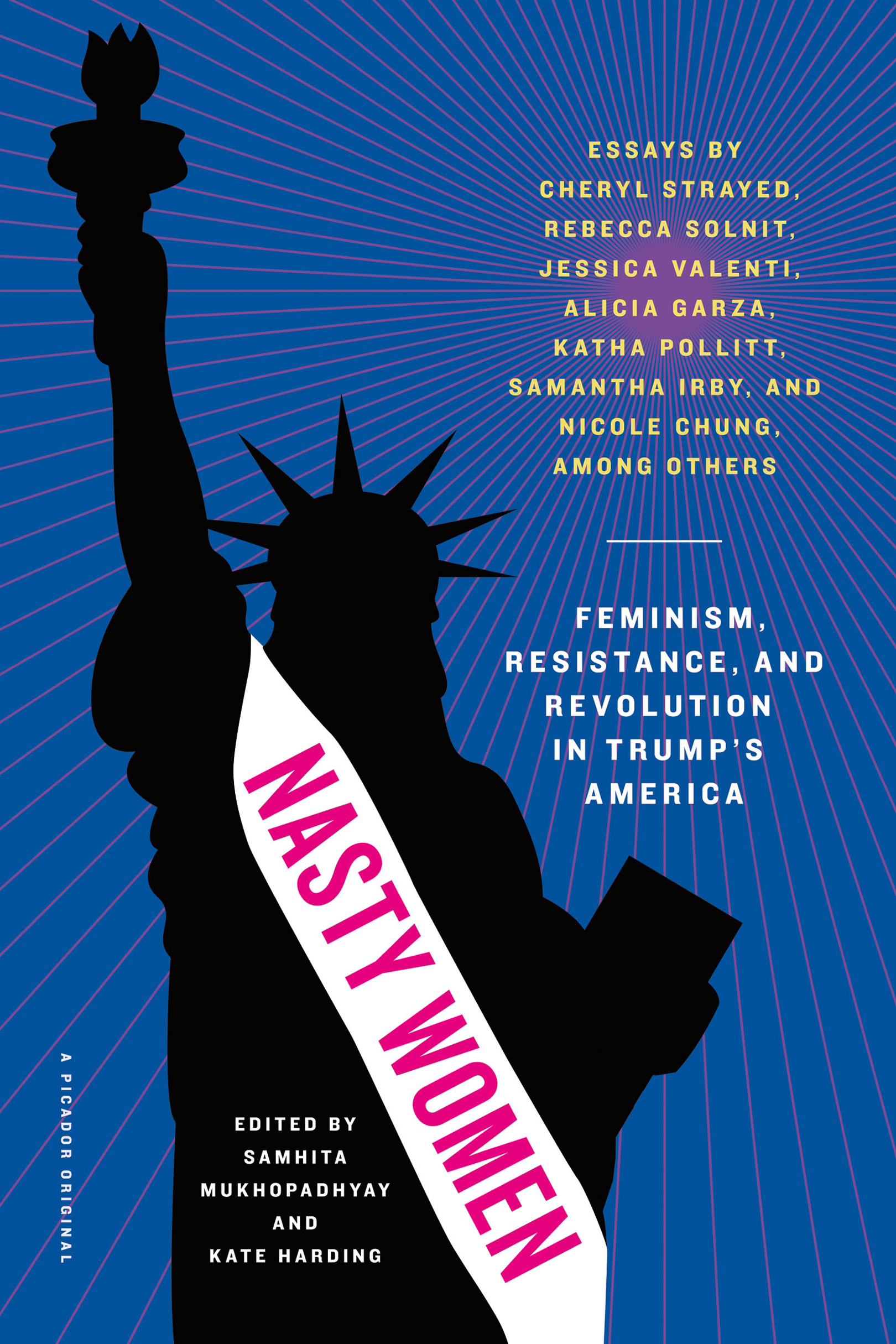Contents
Guide
Pagebreaks of the print version

The author and publisher have provided this e-book to you for your personal use only. You may not make this e-book publicly available in any way. Copyright infringement is against the law. If you believe the copy of this e-book you are reading infringes on the authors copyright, please notify the publisher at: us.macmillanusa.com/piracy.
Samhita Mukhopadhyay
U NDERNEATH THE LARGEST GLASS CEILING in New York City, Hillary Clintons campaign planned to celebrate victory at the Javits Center, on election night 2016. I gathered there along with thousands of others to witness Clinton make history as the first female president of the United States.
In the lead-up to the election, polls had the former senator and secretary of state leading reality-TV star Donald Trump by at least 4 to 6 percentage points. The New York Times gave Clinton an 85 percent chance of winning. As an editorial director at Mic, an online news and culture website for millennials, I had also planned for a Clinton victory, assigning a dozen or so stories, and had written and revised a two-thousand-word piece about this big, albeit fraught, moment in feminist history.
We all know how this story goes. At around 10 p.m., CNN called Ohio for Trump. The mood at Javits turned grim, but viewers held out hope. Idaho and North Carolina followed, and then the tipping point: Florida. By now, small groups of women were sitting on the ground crying; hundreds left the building in droves. Amid the chaos, I realized I had to make my way back to the office. We had to rewrite everything. Donald Trump was going to be president.
The intact glass ceiling at the Javits Center turned out to be a metaphor even more apt than the Clinton campaign could have imagined.
The 2016 election wasnt just a loss for Clinton, it was a loss for feminism. Not only did the first female candidate from either major party lose, she lost to an open misogynistsomeone who called a former Latina beauty queen fat and was caught on the record bragging about grabbing women by the pussy. Despite that the election played out like a morality tale gone wrong, in which the smart girl who had done her homework loses to the class clown who barely shows up for school, in its wake progressives seemed to bristle at discussing the role sexism and racism played in it. Instead, they openly debated whether the campaignand the left more generallyhad focused too much on identity politics: on Clinton being the first viable woman candidate for president and catering to minorities and their concerns, instead of speaking to the economic anxieties of the white working class.
Born of the civil and womens-rights activism of the 1970s, identity politics seeks to recognize and organize around the complex and interwoven ways race, class, gender, immigration status, and sexuality, among other factors, impact how life is lived in Americaand who has access to the American dream. Both a political and intellectual movement, identity politics offers a critique of privilege and the ways it is meted out. It has been pilloried by critics on the right and left who say its focus on difference is divisive. At the heart of the debate is the fundamental question of how we conceive of ourselves as a country: Do we recognize that different groups of people experience unique challenges based on their identity and organize around and embrace those differences, or do we ignore them in service of a more universal, uniform understanding of Americanness?
Clintons campaign banked on the former, speaking directly to the interests of women, people of color, sexual minorities, and the disabled. Her campaigns rallying cryIm with herwas a clear reminder that she was the first woman presidential candidate for a major party. In what would come to be regarded as a tactical faux pas, Clinton dared to refer to Trumps supporters as deplorables for their regressive views on race and sexuality. In the third presidential debate, she ardently supported the right to an abortion: I will defend Planned Parenthood. I will defend Roe v. Wade, and I will defend womens rights to make their own health care decisions, she said. In a powerful ad, she juxtaposed shots of women, people of color, and people with disabilities with footage of Trump denigrating these groups. The campaign included women and people of color in senior positions, and the mothers of Trayvon Martin, Tamir Rice, and Eric Garner appeared at several campaign stops, after Clinton personally met with the women and promised to advocate on their behalf.
This is not to say that Clinton had always done right by the communities she courted during the election. When her husband was president, she supported the passage of NAFTA, which some have argued exported well-paying American jobs; the 1994 Violent Crime Control Act, which is credited with fueling the mass incarceration epidemic that disproportionately impacts black men; and the 1996 Personal Responsibility and Work Opportunity Reconciliation Act, Bill Clintons attempt at welfare reform, which is known for leading the way to criminalizing and stigmatizing welfare recipients. Her own ties to Wall Streetwhose subprime lending practices caused the housing crisis, which disproportionately impacted the black community and its decades of progress in financial growthdogged her as a candidate.
After Clinton lost the election, criticism of her campaigns approach came swiftly. In a much discussed op-ed for The New York Times, Mark Lilla argued that American liberalism has slipped into a kind of moral panic about racial, gender and sexual identity that has distorted liberalisms message and prevented it from becoming a unifying force capable of governing. Lillas views were reinforced by liberals also warning of the electoral consequences of following Clintons strategy. In a Washington Post op-ed, John B. Judis wrote that the left overestimated the strength of a coalition based on identity politics.
Echoing similar sentiments, Senator Bernie Sanders regularly criticized Clinton for failing to focus on issues of class. We need a Democratic Party that is not a party of the liberal elite but of the working class of this country, Sanders said in March. Its not good enough for someone to say, Im a woman! Vote for me! he said at a rally in Boston after the election. What we need is a woman who has the guts to stand up to Wall Street, to the insurance companies, to the drug companies, to the fossil fuel industry.
Sanders is right in suggesting we need more than token references to identity to galvanize authentic support from voters, but it is important to remember that most identity politics are about class. And Clinton did talk about class during her campaignabout equal pay for women, paid family leave, increasing the minimum wage, a fair tax system, and revitalizing American manufacturing. She proposed a $10 billion investment fund to encourage companies to produce goods in America as well as tax credits to help revitalize areas devastated by deindustrialization. Manufacturing is coming back, she said during the campaign. My job as your president will be to do everything I can to create more good-paying jobs, to get wages rising again for American workers and families.
Exit polls also failed to substantiate the claim that Clintons campaign didnt speak to economic anxieties in the electorate. Black womenthe poorest demographic in the countryvoted for Clinton at a rate of 94 percent. According to an analysis of exit polls by The New York Times , 53 percent of Americans making less than $30,000 per year voted for Clinton versus 41 percent for Trump. In those same exit polls, 52 percent of voters who listed the economy as their top political issue of concern voted for Clinton (as opposed to 42 percent who voted for Trump).


